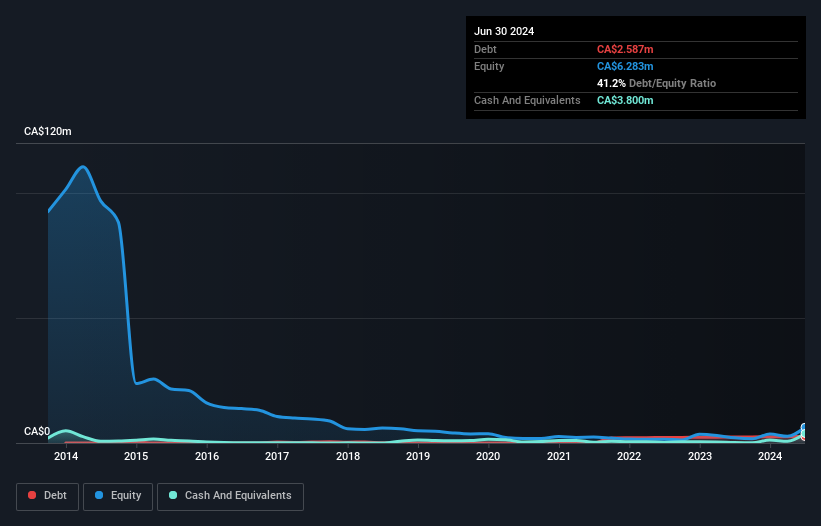
Warren Buffett famously said, 'Volatility is far from synonymous with risk.' It's only natural to consider a company's balance sheet when you examine how risky it is, since debt is often involved when a business collapses. We can see that New Zealand Energy Corp. (CVE:NZ) does use debt in its business. But is this debt a concern to shareholders?
When Is Debt A Problem?
Debt is a tool to help businesses grow, but if a business is incapable of paying off its lenders, then it exists at their mercy. In the worst case scenario, a company can go bankrupt if it cannot pay its creditors. However, a more frequent (but still costly) occurrence is where a company must issue shares at bargain-basement prices, permanently diluting shareholders, just to shore up its balance sheet. By replacing dilution, though, debt can be an extremely good tool for businesses that need capital to invest in growth at high rates of return. When we think about a company's use of debt, we first look at cash and debt together.
View our latest analysis for New Zealand Energy
How Much Debt Does New Zealand Energy Carry?
As you can see below, at the end of June 2024, New Zealand Energy had CA$2.59m of debt, up from CA$2.39m a year ago. Click the image for more detail. However, its balance sheet shows it holds CA$3.80m in cash, so it actually has CA$1.21m net cash.

How Strong Is New Zealand Energy's Balance Sheet?
Zooming in on the latest balance sheet data, we can see that New Zealand Energy had liabilities of CA$1.48m due within 12 months and liabilities of CA$10.3m due beyond that. On the other hand, it had cash of CA$3.80m and CA$435.7k worth of receivables due within a year. So its liabilities outweigh the sum of its cash and (near-term) receivables by CA$7.58m.
While this might seem like a lot, it is not so bad since New Zealand Energy has a market capitalization of CA$13.2m, and so it could probably strengthen its balance sheet by raising capital if it needed to. However, it is still worthwhile taking a close look at its ability to pay off debt. While it does have liabilities worth noting, New Zealand Energy also has more cash than debt, so we're pretty confident it can manage its debt safely. The balance sheet is clearly the area to focus on when you are analysing debt. But you can't view debt in total isolation; since New Zealand Energy will need earnings to service that debt. So if you're keen to discover more about its earnings, it might be worth checking out this graph of its long term earnings trend.
In the last year New Zealand Energy had a loss before interest and tax, and actually shrunk its revenue by 60%, to CA$1.3m. To be frank that doesn't bode well.
So How Risky Is New Zealand Energy?
We have no doubt that loss making companies are, in general, riskier than profitable ones. And the fact is that over the last twelve months New Zealand Energy lost money at the earnings before interest and tax (EBIT) line. And over the same period it saw negative free cash outflow of CA$3.4m and booked a CA$3.0m accounting loss. But at least it has CA$1.21m on the balance sheet to spend on growth, near-term. Overall, we'd say the stock is a bit risky, and we're usually very cautious until we see positive free cash flow. There's no doubt that we learn most about debt from the balance sheet. But ultimately, every company can contain risks that exist outside of the balance sheet. Case in point: We've spotted 4 warning signs for New Zealand Energy you should be aware of.
If, after all that, you're more interested in a fast growing company with a rock-solid balance sheet, then check out our list of net cash growth stocks without delay.
If you're looking to trade New Zealand Energy, open an account with the lowest-cost platform trusted by professionals, Interactive Brokers.
With clients in over 200 countries and territories, and access to 160 markets, IBKR lets you trade stocks, options, futures, forex, bonds and funds from a single integrated account.
Enjoy no hidden fees, no account minimums, and FX conversion rates as low as 0.03%, far better than what most brokers offer.
Sponsored ContentValuation is complex, but we're here to simplify it.
Discover if New Zealand Energy might be undervalued or overvalued with our detailed analysis, featuring fair value estimates, potential risks, dividends, insider trades, and its financial condition.
Access Free AnalysisHave feedback on this article? Concerned about the content? Get in touch with us directly. Alternatively, email editorial-team (at) simplywallst.com.
This article by Simply Wall St is general in nature. We provide commentary based on historical data and analyst forecasts only using an unbiased methodology and our articles are not intended to be financial advice. It does not constitute a recommendation to buy or sell any stock, and does not take account of your objectives, or your financial situation. We aim to bring you long-term focused analysis driven by fundamental data. Note that our analysis may not factor in the latest price-sensitive company announcements or qualitative material. Simply Wall St has no position in any stocks mentioned.
About TSXV:NZ
New Zealand Energy
Engages in the exploration and production of oil and natural gas in New Zealand.
Slight with mediocre balance sheet.
Market Insights
Community Narratives




